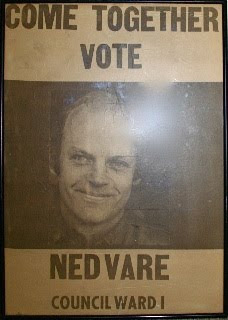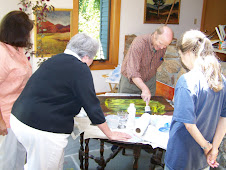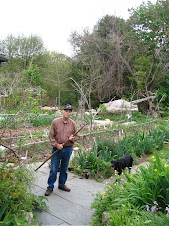
Our neighbors, Mike Elliot and Marjorie Pawling wrote:
Ned Vare, whose passions were so extensive he would have made a Renaissance man proud, died July 22 in his home in Guilford at the age of 75. He had been diagnosed with pulmonary fibrosis and in declining health for several months.
Known to many in Guilford through his regular appearances on public access television lambasting the public school system and extolling the virtues of home schooling, he was much more than a contrarian to officialdom.
He found in golf, architecture, and even politics avenues to explore his appetite for adventure and excellence. Author of books on golf and home schooling, he was also an avid gardener who lectured on that subject, as well.
He lived the last 18 years of his life in a house he designed with an array of features inspired by his time in the West. On the walls were pictures he had painted and in the living room, furniture he had designed. Outside, the landscape reflected his love affair with nature and his desire to live in harmony with his environment. Benefiting from passive solar gain, his plants came to life indoors ahead of the season; innovative rain barrels provided water for the extensive gardens, and the bounty of the flowers and vegetables were shared with many fortunate friends.
Born in 1934 in Philadelphia, he was the son of Glenna Collett Vare, a champion golfer who won the United States Amateur Championship six times during the 1920s, and who was called the “female Bobby Jones” of her time. His father, Edwin Hornberger Vare, was descended from a prominent political family in Philadelphia and an avid sportsman in his own right.
The son would begin collecting his own trophies in his youth and went on to Yale University where he captained the golf team. He also captained the squash team while pursuing his architectural studies. But, unlike his polo-playing father, the only horses in the son's life would be workhorses.
After graduation in 1956, he worked for various architects in New Haven, and also became a golf professional with a short stint on the PGA Tour. Later he moved to Conway, N.H. where he taught elementary school and got serious about the business of learning and educating himself. In later years he would take numerous teaching assignments at alternative schools.
In the early 1960s, he traveled West first settling in Taos, N.M., where he added ski instructor and house painter to his resume. He moved on to Aspen, Colorado where he became active in local politics. Elected a City Councilman in 1969, he was part of a group who tried to resist the rapid emergence of their idyllic ski resort into a winter sports capital.
Commercialization won out, and Vare moved on. This time to Silt, Co., where he bought a 240-acre spread, and began the life of a rancher, growing barley, alfalfa, and vegetables. There he met his wife, Luz Shosie, who would share his passions for the outdoors and an independent lifestyle.
They returned to the site of his undergraduate days in 1984 with their 4-year-old son, Cassidy. Faced with the prospect of sending him into a system whose methods they questioned, they began their commitment to home schooling. Eventually, they organized a support group, Unschoolers Unlimited, a group of like-minded parents who believed in letting their children choose what, where, and with whom they would learn.
In New Haven he opened a golf shop and continued teaching his favorite sport. Five years later, with architectural plans under his arm, he searched for the perfect site on which to construct his latest creation, a house inspired by the Navajo hogan of the southwest. He found a sheltered piece of property on the edge of Guilford and built his current home.
He wrote and illustrated his first golf book, “Hip Pocket Golf Coach,” in 1983, and his second, “Golf: The Money Swing,” in 1998. His third book, “Smarting Us Up: The Undumbing of America,” was written with his wife, Luz. He continued to add commentary and instruction on his blog “School Is Hell.”
Never able to stay completely out of the political arena, in 1998 he ran for governor in Connecticut, not surprisingly, on the Libertarian ticket. In 2002 he tweaked the Guilford School District by threatening to run for Schools Superintendent.
Besides his wife, Luz, and his son, Cassidy who owns and operates a bicycle shop in Brooklyn, N.Y., he is survived by twins Jesse Vare of New Castle, CO, and Tai Vare of Malibu, CA; a sister, Glenna Vare Kalen of Narragansett, R.I.; and Cassidy's wife, Kim Kaplan.






























